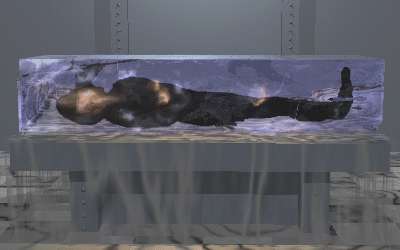pop up description layer
HOME
Cryptozoology UFO Mysteries Aviation Space & Time Dinosaurs Geology Archaeology Exploration 7 Wonders Surprising Science Troubled History Library Laboratory Attic Theater Store Index/Site Map Cyclorama
Search the Site: |
|
The Strange Story of the Minnesota Iceman

In 1968 two cryptozoologists, Ivan Sanderson, a science writer, and Dr. Bernard Heuvelmans, a Belgian naturalist, thought they'd made the find of the century. Heuvelmans had been a house guest of Sanderson when the two of them heard about creature, not quite human and very hairy, that was preserved in a block of ice. The creature had been shown in carnivals and fairs across the mid-western United States. Its exhibitor, Frank Hansen, had claimed that it was a "man left over from the Ice Age" and charged 25 cents for a peek at the thing in its refrigerated, glass coffin. Sanderson and Heuvelmans drove to Hansen's farm where the thing had been stored for the winter. In a cramped trailer they examined the creature and became convinced that they had found a Neanderthal Man, Bigfoot or something similar. After three days of study Heuvelmans believed the beast was authentic. The doctor even smelled the putrefaction where some of the flesh had been exposed from the melted ice. They also discovered that the thing had apparently been shot through the eye. Heuvelmans guessed that the creature had been murdered in Vietnam during the war and smuggled into the United States in a "body bag." Heuvelmans wrote a paper about the beast for the Institute of Natural Sciences in Belgium entitled, "Preliminary Note on a Specimen Preserved in Ice; Unknown Living Hominid." Sanderson wrote an article, called "Living Fossil," on the same subject for Argosy Magazine. The Smithsonian Institution got involved when Sanderson approached Dr. John Napier about scientifically examining the creature. The Smithsonian, though, found out about the murder theory and asked the FBI to investigate. The head of the agency, then J. Edgar Hoover, declined pointing out there was no law violated if the beast was indeed a non-human. (The incident did give Hansen the opportunity to add a sign labeled "The near-Man ... Investigated by the FBI" when the exhibit went back on the road.) An additional twist to the murder story occurred when the tabloid, the National Bulletin, ran a story in which a woman, named Helen Westring, claimed she'd killed the creature. According to the story Westring had been hunting near Bemidji, Minnesota, in 1966 when the thing had attacked her. She had dispatched it with a shot through the right eye. At about the same time a Hollywood special effects firm claimed that they had made the "Iceman" in 1967. Howard Ball, who made figures for Disneyland with his son, Kenneth, had modeled the fake in rubber trying to make it look like "an artist's conception of Cro-Magnon man" with "a broken skull with one eye popped out." Hansen never clearly confirmed or denied that the original creature was a model and, saying that the creature was really owned by a mysterious millionaire, then declined to have it examined further. The Smithsonian lost interest in studying it as they became wary of looking like they had been taken in by a hoax. Sanderson and Heuvelmans, clearly embarrassed, backed off from their original claims about the creature. As for the "Iceman" himself, Hansen removed it from exhibition for a while and even reported destroying it, but rumors are it still shows up at carnivals every once in a while. Copyright Lee Krystek 1996. All Rights Reserved. |
|
Related Links |
|
|



